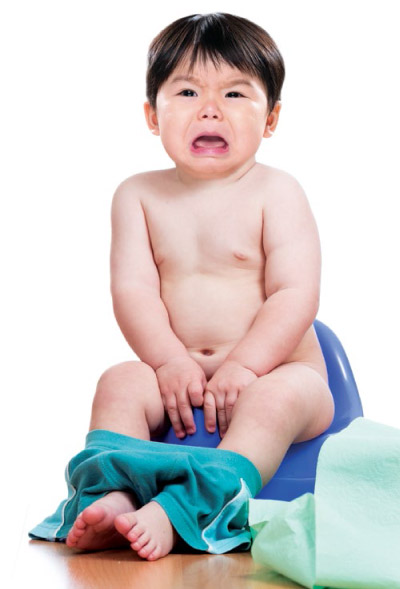Constipation is a common gastrointestinal complaint amongst kids. It occurs when a child has fewer than three bowel movements a week, has trouble with his bowel movements, or if his stool is hard, dry, and unusually large. However, it can be a challenge to deal with constipation even though it is very common amongst children.
What Causes Constipation
While there are many possible causes, the most common cause of constipation is linked to diets that lack enough water and fibre. These two components are crucial as they help ensure proper bowel movement.
Other possible causes include the following:
- Holding it – your child may refuse to ‘go potty’ for a variety of reasons such as wanting to spend more time playing, feeling uncomfortable to use toilets (especially public toilets), feeling embarrassed to ask an adult to bring him to the toilet, or simply as a way to exert his will.
- Medication – if your child’s doctor prescribes him any medication, be sure to ask if it can cause constipation and if you should take any special precautions to prevent it.
- Change of routine – once your child has established a routine, breaking it can lead to constipation. If you are planning a family vacation, be sure to take his potty schedule into account as well.
- Once bitten, twice shy – if your child has experienced painful bowel movements, he may try to avoid a repeat by not going to toilet at all. However, withholding stool causes it to build up in his colon which makes his stools larger and harder (as the colon will continue to absorb water from it) thus, making it more difficult (and painful) for him to have a bowel movement later.
- Stress – New research has shown a link between a person’s emotional state and the state of their digestive health, e.g. emotional upsets can trigger constipation or diarrhoea.
Recognising Constipation
The only way to know if your child is constipated is to monitor his stools and the frequency of his bowel movements. If you have an older child, he may also be constipated if he complains of pain during bowel movements or difficulty with defaecation.
The Bristol Stool Chart
A useful tool that helps you determine if your child’s stool is normal.

Complications
Remember that constipation is not a normal situation. If your child is constipated over a long period of time, it can lead to complications such as rectal bleeding, haemorrhoids (a painful condition caused by swollen blood vessels in the lower rectum and anus), and faecal impaction (the formation and collection of dried, hard stools in his rectum and anus).
Preventing constipation
Here are some things that you should consider:
- Introduce fibre in his diet – this means that he should eat a balanced diet that includes whole grains, fruits and vegetables. The Malaysian Dietary Guidelines for Children and Adolescents recommends two servings of fruits and two servings of vegetables for children between 3 to 6 years old. You can offer him more wholegrain or wholemeal breads, unpolished rice, highbran cereals, and high-fibre biscuits. Beans, legumes and nuts are also good sources of fibre.
- Increase fluid intake – do ensure that he drinks sufficient fluid, especially when he is active or unwell – children between 2-3 years old should drink 1-2 glasses of plain water per day while children above four years should consume 6-8 glasses per day. Remember, this should be practiced daily and not only when constipation is suspected.

- Encourage regular “toilet time” – teach and encourage him to use the toilet regularly. You may need to schedule a time (e.g. after meals) when he sits on the toilet for a few minutes once or even twice daily. Praise him if he passes motion but do not punish him if he does not.
- Patience and understanding – lastly, but most importantly, keep your cool during toilet learning. Take it in your stride whenever he has ‘accidents’ as it is not intentional. This is a learning process for him and should not be a struggle.
Did you know?
Your child’s gut microbiota is established during his first few years of life and gradually becomes more diverse as he ages. There is growing evidence that an imbalance of the gut microbiota results from some disease conditions. This can be prevented by ensuring that certain aspects of the gut microbiota are cared for, e.g. prebiotics and probiotics. In this manner, your child’s health can be maintained or even improved in the course of preventing or treating illnesses.
Prebiotics can help increase bacterial mass and helps the gut to retain some osmotic water-binding capacity. In this way, your child’s stool weight increases, thus ensuring sufficient bulk and softness, which may help relieve constipation in children.
Don’t forget to ensure that he gets at least an hour of moderately intense physical activity daily (such as brisk walking or cycling) as it helps with the movement of food through his digestive system.
Remember, it is best to prevent constipation by ensuring that your child has healthy eating habits and gets enough physical exercise than to suffer the many difficulties associated with constipation, both for your child and you.







Comments